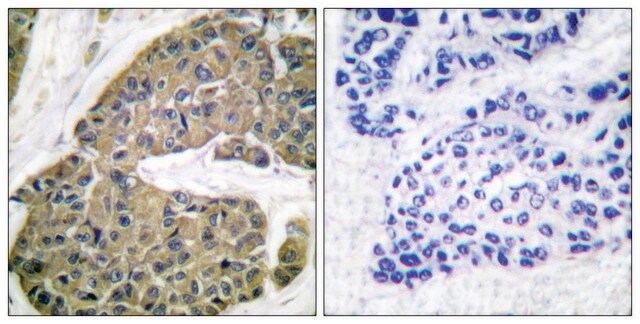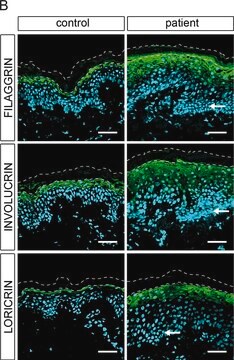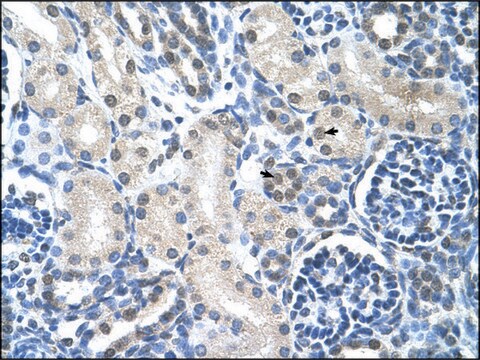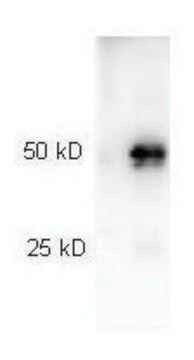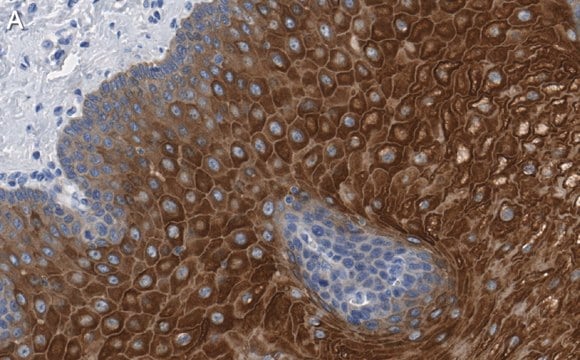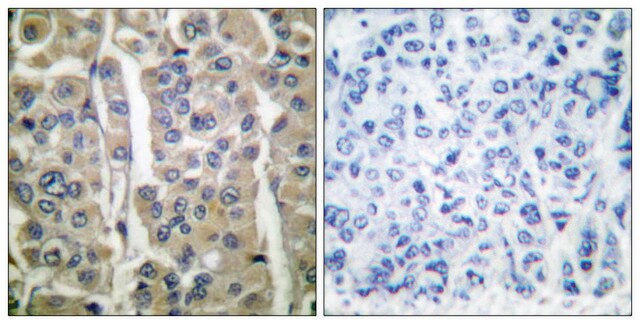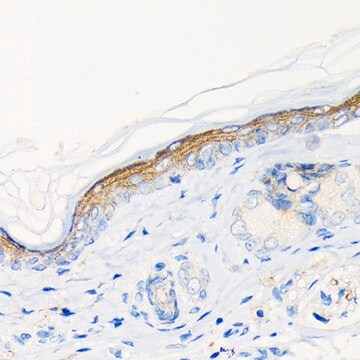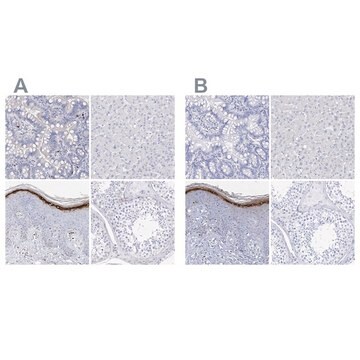추천 제품
생물학적 소스
mouse
Quality Level
항체 형태
purified from hybridoma cell culture
항체 생산 유형
primary antibodies
클론
SY5, monoclonal
형태
buffered aqueous solution
분자량
~68 kDa
종 반응성
canine, gorilla, porcine, mouse, human, owl monkey
농도
~1 mg/mL
기술
immunoblotting: suitable
immunofluorescence: suitable
immunohistochemistry: 2.5-5 μg/mL using human skin sections
immunoprecipitation (IP): suitable
동형
IgG1
UniProt 수납 번호
배송 상태
dry ice
저장 온도
−20°C
타겟 번역 후 변형
unmodified
유전자 정보
human ... IVL(3713)
일반 설명
Monoclonal Anti-Involucrin (mouse IgG1 isotype) is derived from the SY5 hybridoma, produced by the fusion of mouse myeloma cells and splenocytes from a mouse immunized with purified human involucrin. Involucrin is a soluble cytoplasmic protein. It is expressed in a range of stratified squamous epithelia, including the cornea, which lacks a distinct cornified layer.
The skin serves as a vital barrier that protects the internal environment from external influences. As cells start to migrate out of the basal cell layer of the epidermis towards the surface of the skin, it lose the ability to divide and progress towards a terminal differentiation stage. During this process, keratinocytes go through marked morphological and structural changes. At the same time, the synthesis of important differentiation-dependent structural and catalytic proteins is initiated, which include keratins, filaggrin, transglutaminase, loricrin and involucrin. Involucrin (IVL) is a soluble cytoplasmic protein precursor of the epidermal cornified envelope that becomes crosslinked by transglutaminase during envelope assembly. Involucrin is expressed in a range of stratified squamous epithelia, including the cornea, which lacks a distinct cornified layer. It serves as an early marker of keratinocyte differentiation and a component of the cornified envelope. It is specifically expressed in the suprabasal layers of the epidermis. Involucrin accumulates in the spinous and granular layers as a non-crosslinked precursor and becomes covalently crosslinked to other proteins and lipids to form the cornified envelope scaffolding during the final stages of keratinocyte differentiation. Cell that have lost their ability to divide still continue to express Involucrin.
In pathological conditions, involucrin expression may be altered. In psoriasis and other benign epidermal hyperplasias, involucrin expression appears closer to the basal layer than it′s normal expression. In squamous cell carcinomas and premalignant lesions, involucrin is abnormally increases and found to be reduced in severe dysplasias of the larynx and cervix.
Monoclonal Anti-Involucrin specifically recognizes human and mouse Involucrin. The antibody does not react with mouse epidermis, thus enabling the use of the antibody for study of human xenografts in nude mice. The antibody stains the upper spinous and granular layers in human skin and the cytoplasm of suprabasal terminally differentiated keratinocytes in stratified colonies.
In pathological conditions, involucrin expression may be altered. In psoriasis and other benign epidermal hyperplasias, involucrin expression appears closer to the basal layer than it′s normal expression. In squamous cell carcinomas and premalignant lesions, involucrin is abnormally increases and found to be reduced in severe dysplasias of the larynx and cervix.
Monoclonal Anti-Involucrin specifically recognizes human and mouse Involucrin. The antibody does not react with mouse epidermis, thus enabling the use of the antibody for study of human xenografts in nude mice. The antibody stains the upper spinous and granular layers in human skin and the cytoplasm of suprabasal terminally differentiated keratinocytes in stratified colonies.
면역원
purified human involucrin
애플리케이션
Anti-Involucrin antibody, Mouse monoclonal is recommended to use in various immunological techniques, including:
- Immunoblot
- Immunofluorescence
- Immunohistochemistry
- Immunoprecipitation
생화학적/생리학적 작용
Involucrin (IVL) acts as a precursor of the epidermal cornified envelope that becomes crosslinked by transglutaminase during envelope assembly. Involucrin accumulates in the spinous and granular layers as a non-crosslinked precursor and becomes covalently crosslinked to other proteins and lipids to form the cornified envelope scaffolding during the final stages of keratinocyte differentiation. Cells that have lost their ability to divide express involucrin. In pathological conditions, involucrin expression may be altered. In psoriasis and other benign epidermal hyperplasias, involucrin expression appears closer to the basal layer than its normal expression. In squamous cell carcinomas and premalignant lesions, involucrin is abnormally increased and found to be reduced in severe dysplasias of the larynx and cervix.
물리적 형태
Supplied as a solution in 0.01 M phosphate buffered saline, pH 7.4, containing 15 mM sodium azide.
기타 정보
This product is for R&D use only, not for drug, household, or other uses.
적합한 제품을 찾을 수 없으신가요?
당사의 제품 선택기 도구.을(를) 시도해 보세요.
Storage Class Code
12 - Non Combustible Liquids
WGK
WGK 1
시험 성적서(COA)
제품의 로트/배치 번호를 입력하여 시험 성적서(COA)을 검색하십시오. 로트 및 배치 번호는 제품 라벨에 있는 ‘로트’ 또는 ‘배치’라는 용어 뒤에서 찾을 수 있습니다.
J F Crish et al.
Differentiation; research in biological diversity, 53(3), 191-200 (1993-07-01)
Involucrin is a precursor of the keratinocyte cornified envelope that is specifically expressed in the suprabasal layers of the epidermis and other stratifying squamous epithelia. To study involucrin gene expression and the function of involucrin, we expressed a 6 kb
R H Rice et al.
Cell, 11(2), 417-422 (1977-06-01)
A small proportion of the protein of stratum corneum of human epidermal callus is insoluble even when boiled in solutions containing sodium dodecylsulfate and a reducing agent. This protein is present in the cornified envelope, a structure located beneath the
James F Crish et al.
Oncogene, 21(5), 738-747 (2002-02-19)
Human involucrin (hINV) is a keratinocyte protein that is expressed in the suprabasal compartment of the epidermis and other stratifying surface epithelia. Involucrin gene expression is initiated early in the differentiation process and is maintained until terminal cell death. The
N Maas-Szabowski et al.
The Journal of investigative dermatology, 116(5), 816-820 (2001-05-12)
Organotypic cocultures of keratinocytes and fibroblasts generate a normal epidermis irrespective of the species and tissue origin of fibroblasts. The use of mouse fibroblasts and human keratinocytes facilitates the identification of the origin of compounds involved in epidermal tissue reconstitution
E F Griffin et al.
Journal of cell science, 102 ( Pt 4), 799-805 (1992-08-01)
A novel procedure involving the sequential use of two different antisense constructs has been used to inhibit the synthesis of involucrin in a hybrid cell line formed by the fusion of a human cervical carcinoma cell with a normal human
자사의 과학자팀은 생명 과학, 재료 과학, 화학 합성, 크로마토그래피, 분석 및 기타 많은 영역을 포함한 모든 과학 분야에 경험이 있습니다..
고객지원팀으로 연락바랍니다.